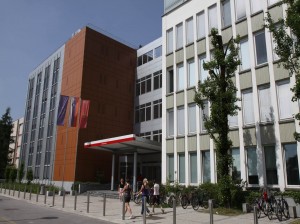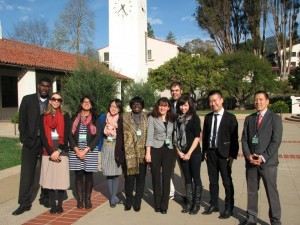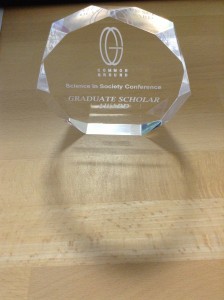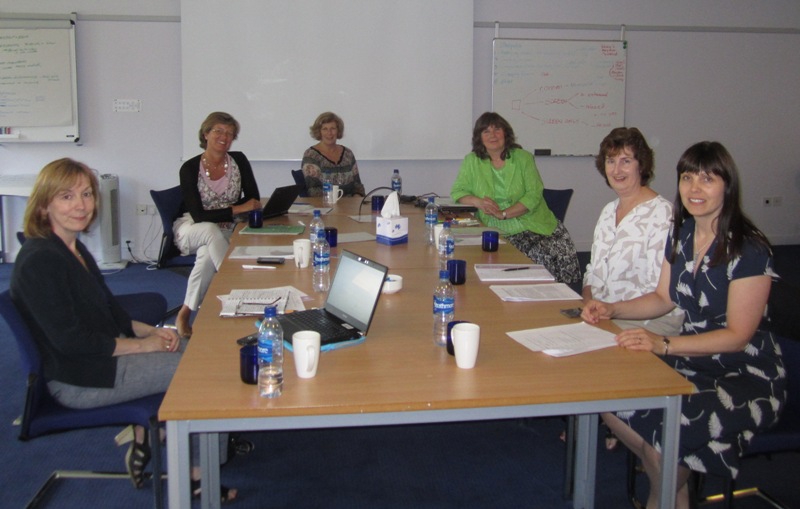A recent paper by Professor Vanora Hundley is receiving significant interest and is to feature in the British Journal of Obstetrics and Gynaecology’s Twitter Journal Club. For the last two years the BJOG has provided questions and slide sets to help readers evaluate selected papers in their local Journal Club. However, the introduction of the new Twitter Journal Club allows readers across the world to engage in online critical review and discussion. In addition to the paper, participants are provided with a scenario, background to the clinical issue, helpful details about the paper and discussion points. Journal club members participate in the discussion via Twitter using a specified hashtag (#BlueJC). The discussion session starts on 20 March 2013 at 17:00 GMT and is open to anyone to join. For further details see: http://www.bjog.org/details/news/4459851/Blue_JC.html
Tagged / CMMPH
EUNF award enables research with the University of Ljubljana
An EU Networking Fund (EUNF) award made to Vanora Hundley will enable research collaboration between Bournemouth University and the University of Ljubljana. Established in 1918 the University of Ljubljana is the oldest and largest university in Slovenia.
 The EUNF award will enable Vanora to travel to Ljubljana to discuss research on the topic of intervention in childbirth; an issue that is challenging many high income countries. The University of Ljubljana has run a midwifery programme since 1996 and currently admits 30 students a year. Research is a core component of midwifery education, as it is in other European institutions including Bournemouth University. However, postgraduate research in midwifery is less common there and it is hoped that this collaboration can strengthen midwifery research in Slovenia.
The EUNF award will enable Vanora to travel to Ljubljana to discuss research on the topic of intervention in childbirth; an issue that is challenging many high income countries. The University of Ljubljana has run a midwifery programme since 1996 and currently admits 30 students a year. Research is a core component of midwifery education, as it is in other European institutions including Bournemouth University. However, postgraduate research in midwifery is less common there and it is hoped that this collaboration can strengthen midwifery research in Slovenia.
HSC Student receives Graduate Scholar Award at University of Berkeley Conference.


Sheetal Sharma, HSC presented at the Science in Society conference (SiS) at Berkeley University in November 2012 where she received a Graduate Scholar Award http://science-society.com/the-conference/graduate-scholar-award
As a PhD student presenting it’s an opportunity to practice for the inevitable viva and a chance to reflect on your work, as there’s always a question you do not expect. For instance, I had a few questions on cultural aspects of my PhD mixed-methods evaluation. That helped me prepare for my transfer viva, where I was asked on the cultural context of the health promotion intervention, specifically in a country context, run by Green Tara Nepal: http://www.greentaratrust.com/ The plenary was the Presidential Commission for the Study of Bioethical Issues http://www.bioethics.gov/cms/node/778 on ethics and morality of science.
Conferences can be competitive, in the sense, you need to be accepted. Secondly you also can compete for a ‘free space’ and in this instance you were able to compete to be a chair. At SiS, graduate students were invited to, through a very formal application process, to be chair of session. Although it means you won’t attend certain talks, the trade-off is worth is as one is forced to think of questions or how to manage, and be critical and aware of several issues of research.
Being ‘forced’ to be critical led to my planning more what aspects I want to present to the audience. This conference was concerned with the science of health, its epistemology and helped me think of how to discuss the development of theory. As in a PhD viva one might need to answer ‘new knowledge to the field’ how the theory or models proposed are better than competing theories.
I was also lucky to visit Howard University, where I spend time researching cultural ‘appropriateness’ of health programmes, specifically should postnatal care be done again at 40 days. For my PhD evaluation of the Green Tara Nepal that the cultural sensitive aspect led to its increase in health services uptake. I encourage those interested to visit their work as they are ranked school in the top 20% of social work programmes. The World Bank and USAID frequently have invitations to talks, the ones I attended highlighted the focus of women in development, what role programmes can play to develop rural areas; as it is women in Nepal who ‘stay’ in the villages to farm and care for the family as men migrate abroad or to the capital city Kathmandu.
This experience helped me begin the reflection of what my evaluation means, whether in a policy context or the epistemological context; on my return I spoke to my supervisory team. Prof. Edwin van Teijlingen, Prof. Vanora Hundley, Dr. Catherine Angell and my external supervisor Dr. Padam Simkhada (University of Sheffield) who encouraged me to on this basis strengthen my writing for my discussion on what the research done has meant.
Global Women’s (GLOW) Research Conference
The first Global Women’s (GLOW) Research Conference was held in Liverpool this week. The conference brought together 150 researchers and clinicians from across the globe to discuss women’s health in both low and high resource countries. Keynote speakers included France Donnay from the Bill & Melinda Gates Foundation, and Beverly Winikoff from Gynuity Health Projects.
 BU was well represented with poster presentations from Vanora Hundley, Professor of Midwifery, and Emma Pitchforth, Visiting Fellow.
BU was well represented with poster presentations from Vanora Hundley, Professor of Midwifery, and Emma Pitchforth, Visiting Fellow.
Vanora’s presentation examined the Use of oral misoprostol to prevent postpartum haemorrhage in home birth settings in low resource countries; a topic that has been the subject of considerable controversy in recent weeks. Emma’s presentation looked at Evidence response mechanisms in reproductive, maternal, newborn and child health in Asia and the Pacific.
One of the unique features of this conference was the mix of presentations. Presenters came from a variety of disciplines and alongside the well known international speakers were oral presentations from undergraduate students and early career researchers. This was a great opportunity to share experiences and build collaborations, and I would recommend that both staff and students look out for next year’s call for abstracts.
HSC PhD student from HSC presents in London at Society for Social Medicine
Sheetal’s SSM poster can be viewed here
Sheetal Sharma a PhD student at Health and Social Care at BU was lucky to be accepted at the Society for Social Medicine (SSM) September Conference in London to present her poster on my PhD research: Mixed-methods evaluation of a health promotion intervention in rural Nepal, complete with a photograph of the fieldwork involved in villages in Nepal! This year was particularly tough getting accepted as conference organisers commented that 360 abstracts were submitted, of which just 159 (44%) were accepted (including 3 as plenary presentations, 96 as parallel presentations, and 60 as poster presentations). And further stated that that at another SSM conference, an abstract awarded a poster presentation would have been given an oral presentation.
“My BU supervisors Prof. Edwin van Teijlingen, Prof. Vanora Hundley, Dr. Catherine Angell and my external supervisor Dr. Padam Simkhada (University of Sheffield) supported me to submit an abstract with our Spanish and Argentine academic partners, early this year”. I really appreciated the free place as universities have limited budgets to support their students in presenting at conferences; I doubt I would have attended had I had to meet the costs myself. So a big thanks to BU and SSM for supporting me! After my experiences at SSM 2012, I would encourage students and young researchers to attend SSM, as the research presented is stimulating and the feedback obtained is invaluable, the conference is really well organised, the support team and volunteers are really friendly and helpful! I hope to be a part of the ECR committee based on this conference.”
Sheetal mentioned she particularly enjoyed the workshop session on Evaluation of complex public health interventions, the concepts and methods practical guidance on “how to do it” and the applicability of different study designs, particularly the role of qualitative research by Mark Petticrew (LSHTM), James Hargreaves (LSHTM), and Steve Cummins (QMUL), as it relates to her evaluation on a health promotion intervention that aims to improve childbearing women’s demand of health services.
Sheetal felt it was great to see what research is conducted from institutions across the U.K. and globally, in a dynamic setting specifically the welcome address by Dr Piot who co-discovered the Ebola virus in Zaire in 1976, the Pemberton Lecture, 2012: Ethnicity and health by Peter Whincup. Sheetal feels research students should be encouraged to present as it motivates them to publish and network. Attending the conference in London also gave her a chance to visit the King’s Fund and dine at Lincoln’s Inn in the 19th century Great Hall with a view onto a fresco of Moses and Edward I ending with a guided tour of the Wellcome Collection.
The International Early Labour Research Group
Photo (L to R): Dr Helen Cheyne (University of Stirling), Dr Mechthild Gross (Hannover Medical School), Dr Mary-Ann Davey (La Trobe University), Professor Patti Janssen (University of British Columbia), Professor Helen Spiby (University of Nottingham), and Professor Vanora Hundley (Bournemouth University). Not shown Gillian Hanley (University of British Columbia).
Researchers from across the globe met in Stirling last week to discuss early labour research and to plan an international collaborative study. The meeting was the result of a successful Canadian Institutes of Health Research (CIHR) planning grant to bring together researchers from Canada, Australia, Germany, England and Scotland. We have met on a number of occasions in the last couple of years, but usually at a conference when time is limited, so it was a real luxury to have two full days to discuss early labour care and to plan a possible intervention for women in the latent phase of labour. Although we have all conducted studies in this area, developing a complex intervention for use in five countries raises many novel challenges. Discussion focused on the varying models of care and current guidelines – the NICE and KCND guidelines used in the UK were much appreciated by our international colleagues. We left the meeting invigorated, but also aware that there is much to do. The first step will be a special issue of Midwifery later this year dedicated to early labour and guest edited by two of the team.












 BU attendance at third annual GCPHR meeting in June
BU attendance at third annual GCPHR meeting in June Interactive Tangible and Intangible Heritage Applications – BU student work featured in new book chapter
Interactive Tangible and Intangible Heritage Applications – BU student work featured in new book chapter Second NIHR MIHERC meeting in Bournemouth this week
Second NIHR MIHERC meeting in Bournemouth this week MSCA Postdoctoral Fellowships 2025 Call
MSCA Postdoctoral Fellowships 2025 Call ERC Advanced Grant 2025 Webinar
ERC Advanced Grant 2025 Webinar Horizon Europe Work Programme 2025 Published
Horizon Europe Work Programme 2025 Published Horizon Europe 2025 Work Programme pre-Published
Horizon Europe 2025 Work Programme pre-Published Update on UKRO services
Update on UKRO services European research project exploring use of ‘virtual twins’ to better manage metabolic associated fatty liver disease
European research project exploring use of ‘virtual twins’ to better manage metabolic associated fatty liver disease